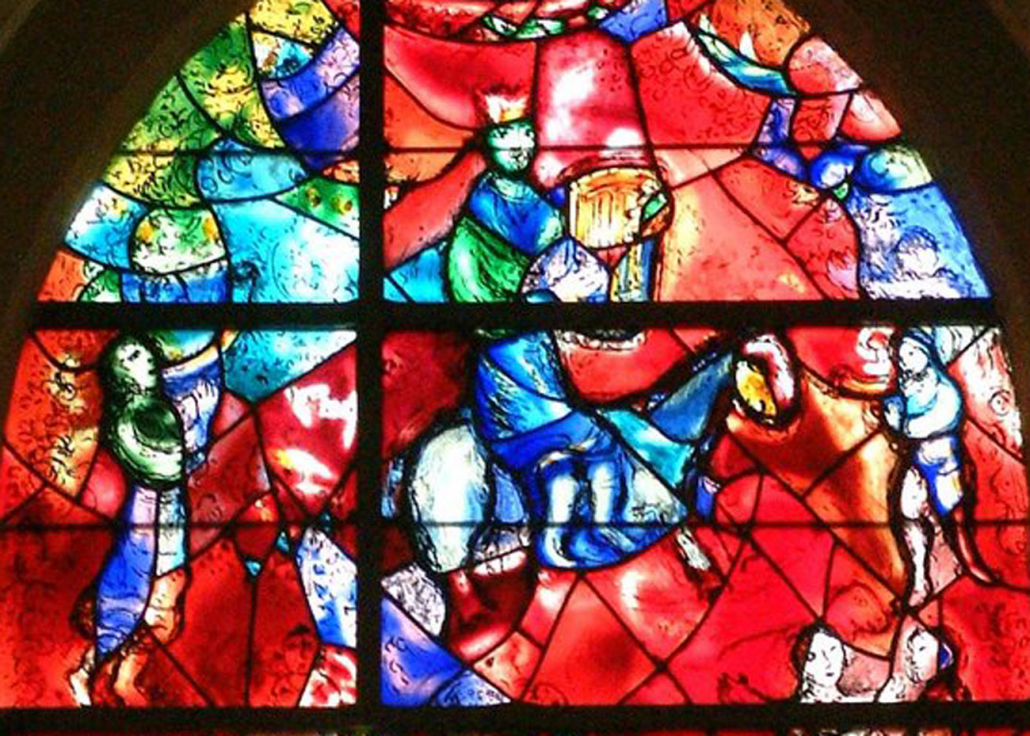Image: ‘Let everything that hath breath praise the Lord’, Marc Chagall, 1978, stained glass, Chichester Cathedral.
‘Busy being born’
Andrew Collis
Lent 2, Year A
Psalm 121; John 3:1-17
The answer to all manner of questions – issues of social justice, human rights, ecological and existential crises – depends on the movement and guidance of Spirit, on stopping to listen for the Word the Spirit brings, on connection to the Spirit-filled world (slight breezes and mighty storms), relationship in the Spirit, and so on. “The answer, my friend,” says Jesus, “is blowin’ in the wind” (Bob Dylan).
The question that most interests Nicodemus, however, has to do with rebirth. To borrow another line from the Minnesotan bard: “He not busy being born is busy dying.”
Nicodemus’s question is “How can an adult be born a second time?”
It’s tempting to hear the question as a fool’s question. What a dolt, we think or say. He doesn’t understand the metaphor. He doesn’t comprehend the higher meaning …
This kind of (superior) reading lacks respect – for Nicodemus, for Jesus, and for ourselves. Do I really think Nicodemus, a religious leader of some years and standing, incapable of recognising a religious metaphor? Do I really think of Jesus as delighting in the art of mockery? Do I really imagine the world in simple (binary) terms of timid fools and wise guys?
We might imagine a different view: respectful dialogue. Nicodemus has made a decision to go see Jesus. An educated and decorated community leader, a person with authority and security of tenure, an expert in the ways of religion and culture, ventures by night to visit with a wandering preacher and faith healer. Nicodemus is already busy being born.
Some scholars surmise he came at night for reasons of fear or secrecy. Others say it was a typical after-work meeting of theologians. There’s no hint of disrespect or malice. Perhaps he is curious. He acts on the strength of genuine curiosity. He asks questions. He engages. He is open to hearing something new. He is open to change and growth. He is busy being born.
Perhaps that’s the very reason Jesus offers the metaphor in the first place. It’s an apt thing to say, in keeping with the conversation (by turns playful and reverential).
Nicodemus certainly draws from Jesus a lengthy discourse on God’s maternal love for the world in need of saving (arguably the most well-known gospel utterance). And, reading ahead, Jesus certainly inspires Nicodemus to keep asking questions.
In chapter seven, Nicodemus is a lone witness among the Pharisees and chief priests in defence of Jesus whose downfall they plot and whom they disparage as a “Galilean”, a hillbilly or bogan. Nicodemus refuses to play along. “Since when does our Law condemn anyone without first hearing the accused and knowing all the facts?” he asks. Nicodemus, of course, has heard from the accused and knows at least some of the facts.
In chapter 19, Nicodemus joins Joseph of Arimathea to remove the body of Jesus from the cross. Nicodemus brings “about one hundred pounds of spices, a mixture of myrrh and aloes” so to prepare the body of Jesus for burial.
These public displays of affection, respect and loyalty evince a person very much alive to the Spirit of God – a person, at significant cost and risk, amid hostility and death, busy being born.
He deserves our respect.
“How can an adult be born a second time?” It’s actually a very good question.
How can we honour the wisdom and riches of a tradition, collectively and personally, and yet start again? How might we risk everything we know and have become in the name of a deeply respectful curiosity? Can I open my heart and mind – my very identity – to the strangeness of others? To change? To newness? To Spirit?
One commentator speaks of rebirth from an upper middle-class culture, a protected and protective (religious) culture, into another kind of (religious) culture: a “rawness and real-ness” of life with people unafraid of failure and celebration.
Most people, most of the time, go to where they are known – act on what they already know or think they know. A lot of the time we confuse respect and shows of privacy – keeping to ourselves and those we think we know best.
But sometimes we’re inspired to embrace the awkwardness, to improvise, even to enact change. Sometimes a respectful curiosity – neither idle nor in thrall to idols – leads to newness, rebirth.
That’s one reason art is important to so many of us. Making and showing art is an act of respectful curiosity, exploration, expression, connection, integration of various and conflicting passions, courage, communication, even communion – a coming “out into the light” as Jesus says in John 3:21.
As believers, we are summoned to respectful curiosity, to ongoing conversion … in the context of a sublime assertion of divine love (John 3:16).
All this, of course, is signified in baptism … never a mere ritual but incorporation of “children” into a spirit-filled community.
We could conclude in several ways.
What if we were to think of discerning faith, discerning spiritual gifts (as Nicodemus values Jesus; as Jesus values Nicodemus) in terms of rebirth and new life among us? What if we were to imagine eldership, ministry and service as opportunity for “starting again” – as invitation to openness and risk, improvisation and change … to respectful dialogue, mutual encouragement, overcoming binaries, bearing witness in defence of the disparaged?
In silence, let us consider what the Spirit says to us.
But just before we do that – and we have handouts to help us acknowledge, affirm and nominate leaders/ministers – let’s acknowledge, thank and honour serving elders, our congregational chairperson and secretary, our presbytery representative …
In silence, let us consider what the Spirit says to us … Amen.




